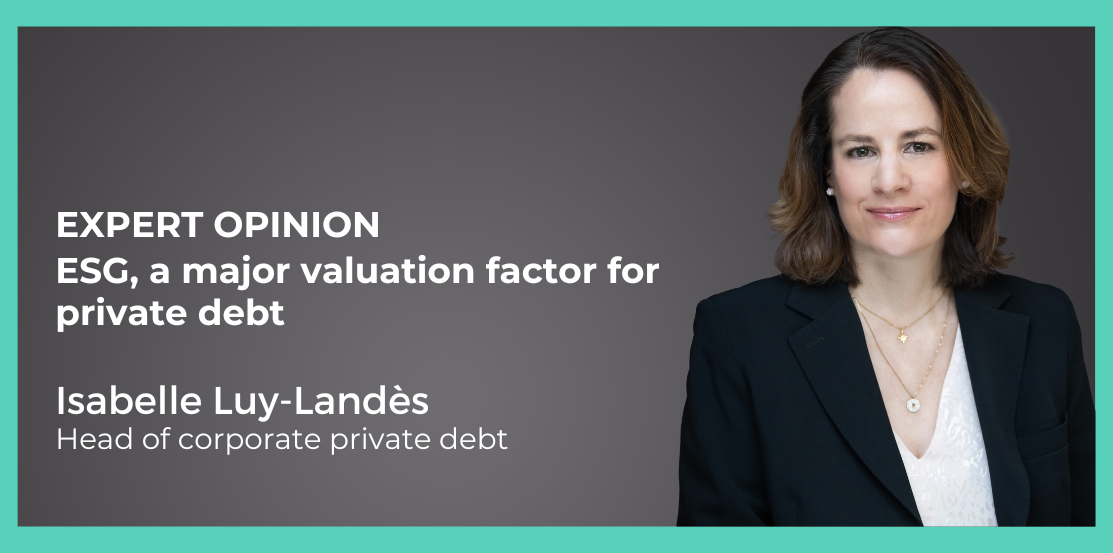ESG, a major valuation factor for private debt
Link

With interest rates and inflation stabilizing at relatively high levels, the spectre of defaults is resurfacing. Should we be concerned about the health of companies in 2024, and consequently revise our private debt investment strategies? Isabelle Luy-Landès, Head of Corporate Private Debt at LBP AM, calls for greater selectivity, particularly with regard to ESG criteria, in the latest issue of Option Finance.
Should we fear a rise in default rates in Europe, in line with the rise in interest rates?
Since 2022, we have been experiencing high inflation, due to the energy shock and rising wage costs. To counter this inflation, which reached 10% at the end of last year, the ECB raised its key rates from -0.5% to 4% between summer 2022 and today. By 2024, we should see interest rates stabilize at around 4% and inflation at around 3%.
Despite these less serene market conditions, companies remain confident. They are relying on the robustness of their business models, effective work on their cost structures, and strong pricing power. The rise in default rates on bank loans in France has therefore been contained: we are not witnessing an explosion, but rather a return to pre-Covid levels, which stood at around 0.6% over the 2013-2019 period, and now stand at around 0.7%. The absence of defaults in recent years (around 0.2% over the Covid 2020-2021 period) was not so much due to the health of companies per se, but rather to the abundance of aid received after Covid, which has now come to an end.
For reasons of prudence, should we stay away from private debt or certain sectors?
No, there's no question of staying on the sidelines if the investor is pursuing a portfolio diversification strategy with lower volatility. On the other hand, asset managers must be more selective. It is essential to carry out due diligence covering all risks, and to model all the consequences of inflation and rising interest rates for the company. Furthermore, companies' short-term liquidity must be the focus of our attention. When it comes to corporate debt, we are sector agnostic: above all, we want robust, cash-flow-generating companies that have proven their resilience by putting in place the necessary safeguards in a constrained environment, capable of withstanding the test of time, and whose management has proven itself through crises.
Investors need to be reassured that corporate debt offers an illiquidity premium, benefits from lower leverage risks and higher spreads, and allows Euribor to be taken on board. It is also possible to design more protective structures for investors. Transaction times are longer, which means that all risks can be carefully studied, and transaction structures and legal documentation can be worked out in detail.
We are convinced that a company that does not integrate SRI into its strategy will find it harder to refinance in the long term, and will lose value in the future.
What role does SRI play in your analysis and monitoring?
Our LBP AM Real and Private Assets platform, launched in 2012, covers the three areas of expertise of infrastructure, real estate and corporate debt. It has a total of 20 professionals, including the Portfolio Management team, which supports the management teams in the day-to-day analysis and monitoring of portfolio companies, enabling us to be extremely responsive. LBP AM has no fewer than 8 people dedicated to SRI, including an expert specifically dedicated to the investment debt platform. SRI due diligence is carried out in the same way as strategic and financial due diligence. The primary aim of taking sustainability criteria into account when analyzing and selecting the companies we work with is to ensure their soundness. We are convinced that a company that does not integrate SRI into its strategy will find it harder to refinance in the long term, and will lose value in the future. We are very committed to management and set social and environmental objectives for companies, accompanied by KPIs.
What corporate debt investment strategy have you chosen to launch in this context?
Our LBPAM Midcap Senior Debt fund is a senior secured debt strategy focused on growing French small and mid caps with a strong positioning in their business sector. We have already made 11 investments in a variety of sectors, including healthcare, industry and business services. This is a variable-rate strategy, including Euribor. Its risk level is measured, with current average net leverage well below 3.5 ×. The special feature of this fund is its Article 9 status. This means that it takes into account the sustainability of companies, which are assigned specific social and environmental objectives at the outset of financing and throughout the life of the operation. The achievement or non-achievement of these objectives results in a bonus or penalty on the loan. This demanding positioning contributes to the sustainable transformation of companies.
Read this interview on the Option Finance website (French Only)